My copy of We Blog: Publishing Online with Weblogs arrived today. skp ordered it for me from Wiley.com, the publisher. (Even authors have to order the book if we want to see it right away.) It's satisfying to see the book in its final form after passing around Word documents for so long. When you're writing and editing you get so mired with details, problems, and deadlines that it's easy to loose site of what you're actually making. Now, after seeing the book it hit me—so that's what I was doing.
There's a patch available for Internet Explorer that fixes some security problems.
I added support for Barnes & Noble and Powells links to the Weblog Bookwatch. So if you link to individual books at these stores (the ISBN must be in the URL) and notify weblogs.com when you update, they'll be included in the mix. It's books only, so the MediaWatch won't be affected by this.
I can't stop playing This Mess We're In by PJ Harvey with Thom Yorke singing. [ra snippet]
Dave is naming names on his weblog. If bloggers become more politically active, I bet we'd find our political leaders tuning into them. (and/or creating them.) I think they'd find it a useful way to take and affect the pulse of their constituants. It's only a small section of their constituancy currently, but more weight for weblogs could mean more participation.
Erik Benson is continuing his work extending the idea behind Weblog Bookwatch with a new site called All Consuming. One nice feature is that he's keeping a cached copy of the weblog on hand so you can see exactly where the book link is in the context of the blog. (A problem I'm attempting to solve by letting people "focus" the link for each book by providing the permalink for the post that mentions the book.) Seeing what he's put together so far has me looking forward to more development. There's so much to be done in this area.
The author behind the Davezilla weblog is being hassled by lawyers from Toho Co., because of the "zilla" in his site's name. Apparently, they feel readers may be confused and think that Davezilla is endorsed by Toho Co. because they own the copyright to "Godzilla." If they want to clamp down on the use of x-zilla and lizard-like creatures they're going to have a huge battle. Once won, they can dig into all of those sites that have "God" in the title as well. Ridiculous.
I haven't digested the trip to Alaska enough to write about it yet. It was so different from any place I've been before, and I know I've only seen a fraction of the surface. Just knowing a place like Alaska exists is forcing me to think about the place I live and the way I live. I definitely want to go back to some of the specific areas we breezed through and spend more time exploring. Until I get that all figured out, pictures! (I whittled it down to 31.)
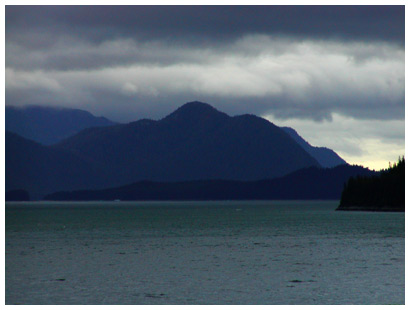
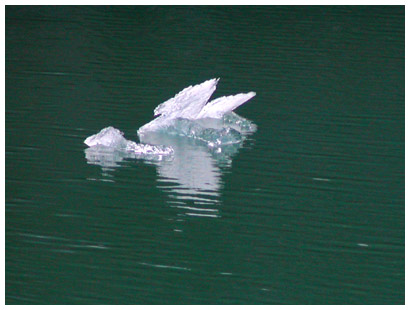
My scanner isn't working at the moment, so I'll have to wait to post some of the 35mm pics I took.


My scanner isn't working at the moment, so I'll have to wait to post some of the 35mm pics I took.
It's good to be home. And more specifically, on land. It's not natural for people to be on the ocean for an extended period of time. (Maybe I feel this way because I grew up in Nebraska, which is about as far away from an ocean as you can be.) It was a fun trip though, and I took 772 pictures. I won't post all of them. (Not all at once, anyway. ;)

Top of a totem pole in Ketchikan, AK

Top of a totem pole in Ketchikan, AK
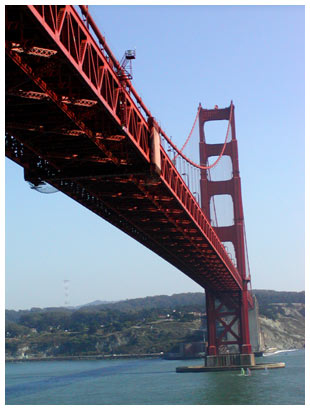
Leaving San Francisco
I'm sitting in an Internet cafe in Skagway, Alaska. The geography is amazing here. I heard someone paraphrasing an early explorer who said, "California has spectacular Yosemite, but Alaska is filled with Yosemites." It's true. The scale of the landscape is like being in Yosemite...everywhere.
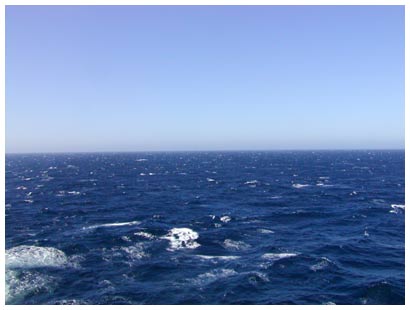
On the ocean
My favorite part of the trip has been spending hours just watching the ocean. It's an extreme difference being out on the ocean compared with land; it's a completely flat landscape apparently without life. (Except the occasional bird, whale, or pod of dolphins...they're few and far between.) It's been a rough ride at times, and we've heard the crew mention this is the roughest ride they've had in years. It made sleeping difficult a few nights, and even though I'm on land now I can feel myself rocking. The rocking motion of the waves gets under your skin.

Approaching Juneau
We're about halfway through the trip. We saw land for the first time in two days yesterday at Juneau where we took a trip to the Mendenhall glacier. We're headed for the glaciers of the Tracy Arm tomorrow.
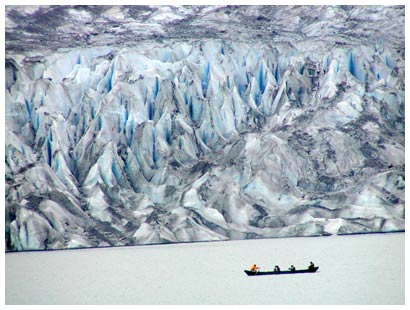
A canoe in front of the Mendenhall Glacier
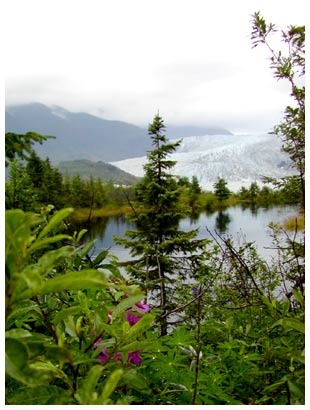
The Mendenhall Glacier near Juneau
The purity of the moonlight,
Falling out of the immense sky,
Is so great that it freezes
The water touched by its rays.
- Anonymous
from One Hundred Poems from the Japanese, Kenneth Rexroth
Falling out of the immense sky,
Is so great that it freezes
The water touched by its rays.
- Anonymous
from One Hundred Poems from the Japanese, Kenneth Rexroth